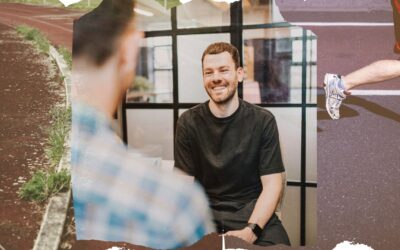We know sporting glory needs more than just a day’s work – but what about the nights? Sidelines finds out how sleep coaches can help elite athletes rest for success.
“You don’t get a medal for sleeping better,” Anna West explains, “but you get a medal when you sleep better and you start to sprint faster, right? You get a medal when you sleep better and all of a sudden your reflexes are better.
“My philosophy is that you should invest just as much in sleep and recovery as you invest in your performance.”
Like the rest of us, professional athletes need rest to be at the top of their game – but unlike most of us, the possible marginal gains from good sleep can help them to global glory. That’s where sleep coaches come in.
“Coaches are increasingly aware of sleep as a major factor in sports performance,” Dr Chris Dickson of Cambridge Sleep Sciences says. “Sleep is so fundamental because it affects multiple different things.”

You’re an endurance athlete? Sleep can impact muscle glycogen stores, which are essential to energy. What about a sprinter? Sleep deprivation could impair reaction times, which can decide photo-finish races – not to mention combat sports, where a slower reaction time could be the difference between a black eye and a gold medal. How about team sports such as rugby or football? Dr Dickson explains how sleep impacts your ability to assimilate information and make decisions, consolidate the skills learned in training, and can also affect the likelihood of muscle injuries.
“The margins between teams or individuals are tiny,” Dr Dickson says, “and so all this stuff really matters.” That’s where sleep specialists such as West, who has worked with football teams in the Premier League and Champions League, come in.
“Sleep is the result of what I do but the intervention of what I do happens during the day in a very multidisciplinary cooperation with everything surrounding high-level sports,” West says. “Everyone has sort of a piece and a potential to influence sleep.” Her role involves cooperating with nutritionists, coaches, and the logistics department to optimise players’ recovery.
That might include convincing national federations to book their players onto business-class seats on overnight flights so they can lie down (“That may sound like a big expense on the logistical side, but it’s an even bigger expense if they don’t sleep and come back and are injured,” she points out), or getting staff members to push electrolytes and water so that dehydration doesn’t keep players from falling asleep at night. It can even be something as small as serving footballers their morning coffee from an outdoor van at the training ground – exposing them to daylight which will help them stay on their circadian rhythm, an internal clock telling the body when to sleep and to wake up. This should improve their ability to recover between fixtures.
“There are some very low practical things that you can implement and that you can affect by making sure that sleep becomes a part of the culture. It becomes a part of the DNA. That having a break and sleeping is not perceived as laziness but actually an investment in performance enhancement,” West explains.
Since starting out with Sir Alex Ferguson’s Manchester United in the late 1990s, sleep coach Nick Littlehales has worked with elite athletes across sports ranging from cycling to weightlifting. He describes how his job has taken him around hotel rooms in Europe, setting them up to help the likes of Sir Bradley Wiggins and Mark Cavendish optimise their rest before long days in the saddle. Littlehales also designed bedrooms for Manchester City’s players at their training facility, orchestrating everything from the lighting to the products inside.
The job sounds complex – but sometimes the work of sleep coaches can be about helping athletes simplify a world of sleep advice that has become increasingly confusing.
“There’s more books, there’s more research, there’s more supplements, devices, and trackers around it,” Littlehales says. “We’ve gone from nobody gives a damn about it, it’s completely taken for granted and we just fit it in at the end of the day – now we’re being bombarded with sleep science and ‘Get your eight hours, or you’re going to die!’
“The first job of anybody is to not overcomplicate it, not to create even more fear about it.”
“Often the interesting part of the job is changing mindsets,” says James Wilson, who has worked as a sleep coach at Rotherham United, Coventry City, and West Ham. “Sleep is very different to being a good athletic performer. You’ve been taught your entire career to try to get better, and then with sleep, the harder you try, the worse it gets.”
With recovery increasingly recognised as a factor in performance – as evidenced by Team GB partnering with Dreams to provide a specialist ‘sleep retreat’ for athletes at the Paris Olympics – sportspeoples’ efforts to optimise it can become a source of stress, such as if they become overly focused on tracking their sleep. Wilson recalls one footballer whose wearable tracker told her she was sleeping poorly, and how she was “distraught” at the idea. He helped her understand the data better by asking three questions: how quickly did you fall asleep last night? How many times do you remember waking in the night? How do you feel at 10-11am?
“By using those three questions over a two-week period and showing her that her sleep was better than she thought, her relationship with sleep changed.
“What we try and do is help players understand themselves individuals,” Wilson says, “and I think that’s the really important bit.”
“I believe that technology can be a massive helping hand implemented in the right way as a support, not a solution,” West adds, “and I believe that technology implemented in the wrong way can create bigger problems.
“I think the worst case scenario is an organisation that just buys a device for every player and hands it out without any education around how you can use it, how you can translate it. Adding into that bad equation would be players having no idea about who has access to their data.” In all her projects, West ensures that a player’s sleep data stays strictly between her and the player (or whoever the player chooses allow access to).
Worrying about their sleep can even drive some sportspeople to take sleeping pills, something Wilson says is “far more rife in sport than people think” – and doesn’t bring the benefits athletes hope for, as the pills bring “sedation” rather than recovery sleep. Education is key to help athletes understand these misconceptions – and, because nobody is immune to poor sleep, building resilience and removing the fear factor is important too.
“One of the techniques I use most powerfully,” Wilson explains, “is ‘let’s talk about times you slept poorly and performed amazingly.’
“You might be rubbish at sleeping the night after a game, but I tell you what, you’re brilliant at dealing with it.”
“I educate them very clearly with some level of resilience towards the bad night sleep,” West says. “If you can’t sleep, the trait is not to obsess around that you can’t. It’s actually to figure out what do I do?”
Building this resilience is crucial, as is helping sportspeople navigate what Wilson refers to as “sleep bollocks” – the products or fads claiming to transform sleep. West recalls her inbox “exploding” with emails after Erling Haaland suggested ‘mouth taping’ for sleep – a fairly self-explanatory technique that aims to encourage nasal breathing, and that most sleep experts treat with caution. When these things crop up, she says, education is key.
“Athletes, football players at this level, they’re not schooled necessarily to critical thinking… we have to be very caring when we work with science in a non-scientific world.”
Similarly, specialists might help sportspeople to navigate the numerous sleep products on the market. Dr Dickson emphasises the importance of research to tell fads from fact.
“Is it science-backed – who’s been developing this and how long have they been working on it? is it just vapourware or is it actually something that’s been properly developed? Also, what is the evidence? Have they actually done studies, and are they conducted using recognized tools for measuring sleep?”
It all sounds very high-tech – but sleep isn’t always. Sometimes, what athletes use to aid their recovery is surprising.
“I don’t know how many athletes I’ve ever coached who’ve got little comfort blankets,” Littlehales laughs. “I’ve seen more Winnie the Pooh comfort blankets than I’ve seen teddy bears.”
And the number one question Wilson gets asked by sportspeople? How an orgasm affects their sleep, particularly the night before a competition. (It can help create a sense of connection and safety, but he does warn against anything “too physically exerting!”)
Some of these questions might sound trivial, but sleep can have a very real impact. By opening athletes’ and organisations’ eyes to how subtle changes and mindset shifts can improve recovery, sleep coaches can help the world’s best sportspeople reach their maximum potential – and if a Winnie the Pooh blanket is part of that equation, then so be it.
The gadgets…
There is a whole spectrum of products athletes can try to improve their sleep, ranging from simple eyemasks to big-budget inventions. Sidelines dives into a couple of the options favoured by Olympians and other elite athletes.
SleepHub is a bedside device which plays sound waves overnight, masked by nature sounds, that are engineered to guide the brain through sleep cycles.Dr Dickson, chairman of Cambridge Sleep Sciences – who created the technology – explains how this can lead to more ‘optimal’ sleep and told Sidelines about some of the elite athletes who’ve used the equipment to feel the benefits of a good night’s rest. “People who’ve had injury problems have been using it…. articularly when people have got significant muscle injuries or worse and they’re in a recovery phase really focused on sleep. We’ve had Olympic athletes in combat sports where reaction time is absolutely fundamental between getting hit or not getting hit.” Footballers, swimmers, and rugby players are also on their client list.
What about during the day? You may have heard of the circadian rhythm, a natural cycle that helps tell the body when to wake up and fall asleep. It is influenced by light – but jet lag can play havoc with it, which is where light therapy can help. “Performance includes obviously being at your best whenever you need it,” explains Alexander Dimitrov, co-founder of AYO. “If we think of athletes who are traveling the world for competition… they can use the device to help them pre-adapt to the new time zone.”
AYO created light therapy glasses, which shine safe levels of blue light into the eyes in short sessions. Athletes can use the glasses to adapt their circadian rhythm before a trip. For example, the Spanish national football team used AYO before flying to Australia ahead of their 2023 Women’s World Cup victory – using the glasses early in the morning to advance their circadian rhythm, and therefore easing their adaptation to the new time zone. As well as the world champions, Dimitrov tells Sidelines that 24-time tennis grand slam winner Novak Djokovic has used the device – as have NBA players including LeBron James, and US National Hockey League team LA Kings. Away from jet lag, Dimitrov describes how the glasses can be used like a “coffee substitute” – boosting alertness ahead of a late-night game or early-morning training session.




